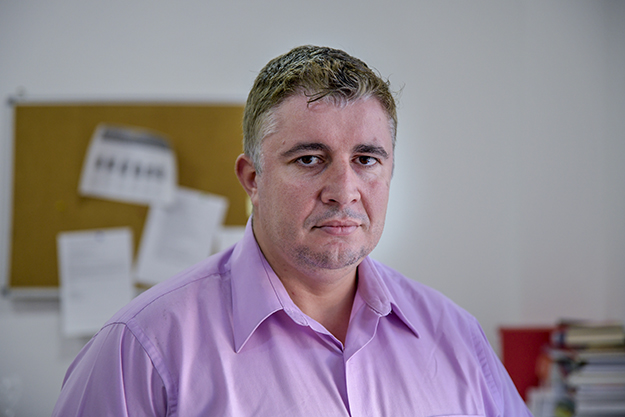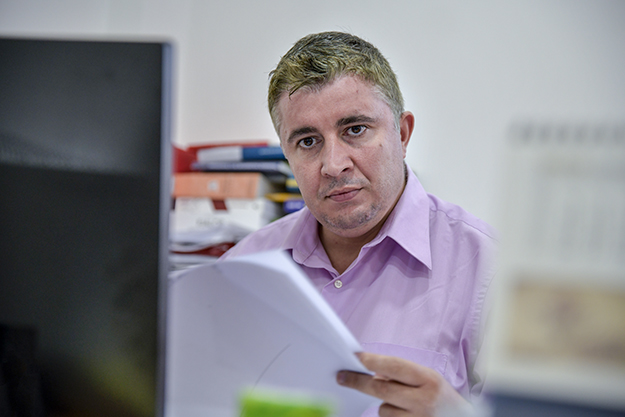Adri Nurellari knows a thing or two about how regional politics function. For more than a decade, he has been close to the very center of power in both Kosovo and neighboring Albania.
Having served as a political adviser to PDK leader and outgoing Kosovo Assembly President Kadri Veseli since 2017, Nurellari spent the preceding five years advising Hashim Thaçi in his current role as President of Kosovo, as well as during his tenure as both prime minister and foreign minister during his time as head of PDK.
But Nurellari isn’t just someone who operates behind the scenes of powerful figures. Over the years, he has also established himself as a prominent columnist, focusing his regular opinion pieces mainly on national and regional developments, while he has also conducted research on liberal ideology issues, as well as international relations and comparative politics.
Originally from Albania, the social scientist completed his undergraduate studies at the University of Tirana before going on to complete postgraduate studies at the University of Cambridge, London School of Economics and University College London.
In between his undergraduate and postgraduate degrees, he was engaged as a lecturer at the University of Tirana for six years, during which time he secured his first job in politics when in 2005 he was appointed as an adviser to Albania’s then newly elected prime minister, Sali Berisha.
Nurellari has also previously served as secretary to the Party for Justice, Integration and Unity (PDIU), a small nationalist party in Albania that among other things advocates for the rights of the Cham community.
Following PDK’s fall from power in recent elections, and during a turbulent time in European and regional politics, K2.0 sat down with Nurellari to discuss how recent developments fit into broader ideas of political theory — from this year’s elections in Kosovo, Greece, Italy and the European Parliament to protests and the political crisis in Albania — and to see what he sees as the stakes in the Kosovo-Serbia dialogue.

Photo: Atdhe Mulla / K2.0.
K2.0: How do you see the recent election results in Kosovo, and specifically PDK’s results?
There has been a significant improvement as a party compared to the 2017 parliamentary elections by adding at least 30,000 votes and three MPs. It is understandable that the rotation [of power] was expected after a long time in power, especially during the last two terms, where PDK carried the costs of the mistakes of two prime ministers who had come from coalition partners.
A great deal of damage was also caused by the anathematization and demonization that was done to PDK by all other parties, which in the campaign proved that they had no vision of the future but only hatred of PDK.
The result would have been even better if the elections had been held a few months later. In fact, chairman Veseli removed from state office and suspended from PDK those PDK representatives who were accused of corruption and nepotism. Also, the PDK convention in June brought more than 65% new leaders, and all of these changes caused dissatisfaction within the party that was still fresh when Prime Minister Haradinaj abruptly resigned.
If more time had passed after these reforms, we would have had a higher turnout of our voters in traditional support areas.
PDK has been accused of servility to the international community in various situations — the creation of the Specialist Chambers, the adoption of the demarcation agreement with Montenegro, the Brussels agreements, the idea of establishing an Association of Serb Majority Municipalities, etc. How do you evaluate these allegations against PDK?
Not only PDK but all other serious Kosovar political forces have been accused of servility as they cultivate good relations with Western allies and commit themselves to meeting the criteria set for achieving Euro-Atlantic integration. These attitudes stem from a Kosovar political segment inspired by Albania’s Enverist isolationist communism dominated by slogans such as “We will eat grass and will not cooperate with foreigners” or “Albania is a self-sufficient granite rock where everything is achieved with our forces.”
These primitive Enverist ideas from the last century do not fit in the age of globalization where Kosovo must behave as a dignified state integrated into the international arena and must strengthen its alliance with the United States of America and other Western allies.
As a researcher of different negotiation processes, how do you evaluate the criticism over the lack of transparency in the negotiations between Kosovo and Serbia?
To me, the many people who speak with so much ease and supposed competence about the elements of the negotiations with Serbia, without reading a book about international relations, negotiations or conflict resolution, are ignorant and naive.
In fact, you only need to look at the continuous negotiations for Palestine or Syria to see that negotiations are not done “with open cards.” No party wants to reveal its weak points in circumstances of diplomatic negotiations, because this information can be used against them.
It’s true that international agreements must be open. In general, today we have international consensus against secret treaties between states; something that was very common in the 19th century, but today is very rare. The turning point came in World War I, when the Bolsheviks of the Soviet Union denounced the London Pact, which was agreed upon secretly between the Triple Entente and Italy. When this agreement became public, it caused indignation and discomfort around the world, thereby fermenting a suitable international climate against international agreements.
As such, one of U.S. President [Woodrow] Wilson’s main proposals in the Paris Peace Conference was to eliminate secret agreements between states. From then on, this position has become an international practice, however this is only for signed agreements, not for negotiation processes that lead to agreements.
What have we learned from the different examples of failure in negotiation processes? Is there a risk that the Kosovo-Serbia negotiation process will fail too? If so, what repercussions could it produce?
If the conflict between Kosovo and Serbia remains unresolved, we will have an incalculable opportunity cost. This problem is gradually transforming into a frozen conflict, something that we’ve seen happen in other countries. Frozen conflicts have been the main cause of stagnation in countries like Moldova, Armenia and others that have open issues.
In circumstances of frozen conflict, there are no foreign investments, the image of a country is violated, and this not only damages its international position, but also the reputation of the products exported from the country.
In a country that has an unresolved conflict, the number of tourists is inconsiderable. Additionally, in circumstances of frozen conflict, it is more difficult for Kosovar entrepreneurs to access new markets and sources of raw materials are limited.
There are many drawbacks and obstacles that come from frozen conflict, as such the status quo must not be seen as something acceptable for Kosovo.
There are claims that we live in a post-ideological era, an era of fusing classic ideological differences. What are your thoughts on this?
I think this fatalist claim is quite exaggerated and does not reflect reality. The truth is that there is a populist anti-establishment wave, which comes either from the left or from the right, but cannot be considered as something stripped of ideology.
On the contrary, what is happening is that radical parties, with clear ideological proposals, are nothing but captors of the electorates of conventional traditional parties, which have proven themselves to be unable to walk with the step of time, and to provide suitable political offers for today’s citizen.
Being in power so often, older parties have left many unrealized promises and unfulfilled expectations, and this has damaged the passionate relations that they once had with their traditional voters. In addition to this, older parties have naturally been forced to make political compromises, because ultimately, at its core, democracy has cohabitation, agreement and understanding between different political groups.
To achieve compromise, parties are forced to find a middle ground and to abandon their political identity. This has forced them to be more forbearing and politically correct in their responses.
However, this fact has been considered as treason by “believers” of ideologies within these parties, thus their supporters have been left disappointed and have embraced new political initiatives that speak more boldly and preserve the ideas that have been “betrayed” by older parties.
This means that a party like Lega Nord [the League, in Italy] has gotten its wings from the European demochristians and Cinque Stelle [the Five Star Movement] from the traditional left. In France, the radicals of the National Front have left Gaullists of the past and the Republicans of the present in the shadows, while [French President, Emmanuel] Macron and his new party have been embraced by the Socialist electorate.
The same happened with Vox, who attracted the traditional electorate of Pardito Popular in Spain, while the extreme electorate of the Spanish Socialists voted for Podemos. None of these parties are post-ideological, in fact they’re super-ideological with rhetoric on steroids, as far as their proposals, positions and ideas go.
How do you evaluate the election results from the European Parliament earlier this year? Is there a genuine risk from parties with populist tendencies — be they from the left or the right?
The election went relatively better than I expected, however there is not much space for enthusiasm or relief as far as Europe’s political climate goes. I say this for three specific reasons. First of all, the composition of the European Parliament is worse than it was, which means less Euro-partisanism, multiculturalism and liberalism, and more anti-immigration, Islamophobia and Euro-skepticism.
Secondly, most extremist populist parties that we fear are anti-European and contemptuous of Brussels, which means their supporters do not even take the European Parliament election seriously.
So, if this year 50.5% of the European electorate took part in the election, we can say that the supporters of these unconventional populist radical parties are mainly in the 49.5% of citizens who didn’t vote. This means that these parties are still very powerful, but are mainly focused on national elections, and at the end of the day, their weight among the European Council is very powerful in Brussels.
How about the results of the recent election in Greece? Why did Syriza lose after only four years in power, despite the euphoria and high expectations that we witnessed in 2015?
Syriza came to power by promising that Greece would bring an end to the restrictions and constraints imposed by Western creditors, while it denounced governments who signed those compromises with the EU and the European Central Bank as traitors. In political science terminology, this tendency is called “outbidding.” It’s basically an elevation of the bargain, because parties in opposition have the luxury of promising everything and expressing radical opinions to get votes.
However, naturally when you enter the government things change, reality is better understood and aggressive, enthusiastic tones are abandoned, because governance requires accountability. As a result, [Alexis] Tspiras, conditioned by the circumstances, continued to implement the strict measures that he had denounced and so his electorate felt betrayed, and shifted again toward the other party wing.

Photo: Atdhe Mulla / K2.0.
For the sake of the truth, we must say that the Greek population is one of the oldest in the world and voters are really conservative, so they are unchangeable in regards to statism. For them, it is difficult to accept that they are also responsible for the crisis that has engulfed Greece, so they blame the state and expect solutions from the state, and they don’t want to bear the cost of fixing Greece’s deep and long-standing economic issues.
So it’s quite likely that soon they will be disappointed with the Nea Dimokratia [New Democracy] party, which is now in government, because the harsh reality cannot be erased. Strict reforms are inevitable, no matter which party is in government.
In Albania, in the past, there have been proposals to implement technological voting. Do Kosovo and Albania need such a system?
In the recent election in Albania — but also in Kosovo — we’ve seen that the main issue or the biggest irregularity that happens is vote manipulation during counting. “Criminals” and “strongmen” have secured an exclusive, decision-making role in the process of administering votes. There are also “criminals” who work in the field, who utilize their experience, willingness and violent means to clash in the service of parties who recruit them, to protect their votes or steal votes from their rivals and opponents.
To put it shortly, the quality of the election system is not guaranteed by the force of the law, but is rather determined by the forces of political militants and mercenaries in the field. The prolonged counting process at Unit Nr. 5 in Tirana during the 2011 local election and the severe clashes in Fier in 2009 are still fresh in everyone’s memory.
The same goes for Kosovo: The only reported issues during elections have been related to irregularities during the counting of votes within [the deputy candidates lists of] parties. The use of electronic voting would automate the process and would disarm these criminals who tamper with the voting process, and as such would enhance the integrity of the election process.
In the past, you’ve criticized the Albanian state for its high taxes. Can you articulate your position on this issue?
The annual international reports for tax payments issued by IFC [the International Finance Corporation] and PwC [Pricewaterhouse Coopers] rank Albania in 122nd position in regard to fiscal burden, while Kosovo is 44th and North Macedonia is 31st.
Through my criticism, I want to shake the notable etatist Albanian mentality that never questions the role of the state. What alarms me is that taxes have been increased, while the quality of services has not. We pay higher taxes but in exchange we receive nothing meaningful from the state, because we have the most outdated infrastructure in Europe.
I want citizens to seek more accountability and responsibility for the way their taxes are used. Moreover, they shouldn’t accept the behavior of arrogant politicians who treat public investments like private donations, rather than use them like money that the citizens have provided themselves.
How do you see the political deadlock in Albania and the conflict between the opposition and the majority?
The current crisis is simply a cyclical crisis, which tells us a lot about the backward political culture in Albania. We’ve had a few political rotations and just about every party has had its time in power and in opposition, and we can honestly say that they do not differ from one another at all.
Today, the political game in Albania is similar to what it was a decade ago. The only difference is that the actors who played the roles have changed, while the script of the drama is just about the same. So, the same scene, the same script, just the roles have changed.
When Rama was in opposition, he applied the same approach of obstructionism, boycotts, protests, political aggressiveness and blockade against the Democratic majority of that time. He did this despite the cost of delaying Albania’s [EU] candidate status for three years.
Today, the roles have changed, and it is the right wing opposition that uses the same obstructive, nihilist script and aggressive rhetoric against the Socialist majority, bringing the idea of opening [EU] negotiations with Albania into question.
To put it shortly, the current situation of conflict between the opposition and majority is a demonstration of the backward political culture.
In December, Albania experienced student protests that were considered to be a rare event in the country’s history of political pluralism. What’s your take on these protests? Is a new political generation being born in Albania as an alternative to the two poles that have been established for the last three decades?
It’s true that these student protests in Albania became very big, won the hearts of many analysts and created the illusion that a kind of new wave of change was coming to Albania thanks to the younger generation. There were those who spoke about a genuine revolution and drew parallels with the student movement of December 1990, which preceded the fall of communism in Albania.
I can describe that protest with the title of Shakespeare’s comedy “Much Ado About Nothing” or, as we say in the Albanian language, “the mountain got pregnant and gave birth to a mouse.” I believe that this illusion found very fertile ground among the revolutionary mentality of Albanians.
In the circumstances of an unconsolidated democratic political culture, which lacks tradition, many citizens have the illusion that toppling the state or implementing a revolution are the best ways to bring about positive change in society. There is a naive and excessive expectation that change comes suddenly, like magic, through protests or through a revolution.
For me, this astonishment with the student protest and the big illusions that were built on its basis, are simply evidence of the culture of politics. This means that people in Albania still have a greater preference for radicalism, aggressiveness, revolution and violence, as opposed to gradualism, institutional reforms or democratic political processes.
And finally, where will we see Adri after completing his work as Kadri Veseli’s advisor?
I believe that I will continue to assist chairman Kadri Veseli in the reforms he is undertaking within the PDK to modernize this party and strengthen the ideological dimension as a conservative center-right party. At the same time I believe that I will be even more active in the media as an opinion writer or within civil society to promote the ideas of classical liberalism, which I have been personally occupied with since being present in Albanian public life. K
This conversation has been edited for length and clarity. The interview was conducted in Albanian.
Feature image: Atdhe Mulla / K2.0.



